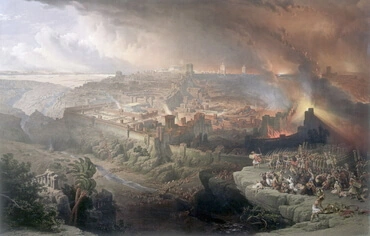Arcana Coelestia # 2400
2400. 'He spoke to his sons-in-law who were marrying his daughters' means together with those governed by truths to which affections for good could be allied. This is clear from the meaning of 'sons-in-law' as cognitions of truth, and consequently truths, dealt with above, in 2389, and from the meaning of 'daughters' as affections for good, also dealt with above, in 2362. And because it is said that he spoke to his sons-in-law who were marrying his daughters, the meaning is, together with those governed by truths to which affections for good were able to be joined. Because those affections could be so joined the expression 'his sons-in-law' is used, but because they had not actually been joined the expression 'who were marrying his daughters' is added.
[2] Here the subject is a third group of persons inside the Church, that is to say, those who have knowledge of truths but nevertheless lead evil lives. There are in fact three groups of people inside the Church:
1. Those in whose lives the good of charity is present; these are represented by 'Lot'.
2. Those who are immersed completely in falsity and evil, and who repudiate both truth and good; these are represented by 'the men of Sodom'.
3. Those who do indeed have knowledge of truths but nevertheless lead evil lives; these are meant here by 'sons-in-law'.
The last of these are chiefly people who teach, but the truth which they teach sends its roots down no more deeply than knowledge solely in the memory is accustomed to do; for it is learned and displayed by them solely for the sake of position and gain. And because with such people the ground in which the truth is sown is accordingly self-love and love of the world their belief in truth is no more than a certain persuasion, resulting from those loves. The nature of that persuasion will in the Lord's Divine mercy be spoken of elsewhere. Here they are described as the sons-in-law who did not believe a thing about the overthrow of Sodom but laughed at the idea. And the faith within their heart is also of that nature.
City

In the ancient world cities were nearly nations unto themselves – they existed within walls, with their own laws and customs, generally centered on the common purpose of trade. This is not as much the case in the modern world, but we still tend to divide ourselves city by city in terms of sports teams, accents, music and culture, and still tend to generalize the character of people from other cities. It follows, then, that in the Bible cities represent various doctrines – collections of inter-related ideas about spiritual reality. Such doctrines can be based on anything from the Lord’s true teachings – the New Jerusalem seen by John in Revelation – to the falsity and heresy of Sodom and various cities obliterated by the people of Israel at God’s command. On the most personal level, a city can also represent the natural mind of one person – which makes sense since we each to some extent have our own doctrine and our own set of ideas and beliefs.






